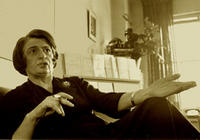National Review vs. Ayn Rand
 Objectivism and conservatism have had a very strained relationship since Ayn Rand gave birth to the objectivist philosophy in the 1950's in her books Fountainhead and Atlas Shrugged. For conservative intellectuals and writers, Rand's primary sin - besides being a bit off her rocker - appears to be her undying devotion to the concepts of:
Objectivism and conservatism have had a very strained relationship since Ayn Rand gave birth to the objectivist philosophy in the 1950's in her books Fountainhead and Atlas Shrugged. For conservative intellectuals and writers, Rand's primary sin - besides being a bit off her rocker - appears to be her undying devotion to the concepts of:(1) the supremacy of mankind and the individual;
(2) reason and rationality as the most important and legitimate guides to human actions;
(3) the rejection of religious doctrines and dogmas, coupled (unfortunately) with a determined atheism.
And this is the rub of the conflict - man without a belief in God, society without belief and organization to compel it, is doomed to barbarism, hedenism, and absent all morality. Morality without God (i.e. the Church) is impossible. This is core to conservative ideology, but more importantly; essential to its political organizing and preserving a base of religious American voters.
National Review magazine, as part of its 50 year anniversary celebration, recently reprinted Whittaker Chamber's "review" of Rand's 1957 Atlas Shrugged. Exceedingly convoluted and driven to personal attacks, Chambers diatribe in Big Sister is Watching You is a must read.
A Half-Century-Old Attack on Ayn Rand Reminds Us of the Dark Side of Conservatism, written by Robert W. Tracinski for Capitalism Magazine hits the nail on the head in calling out National Review for its republishing Chamber's "pompously over-intellectual style" attack on Rand and her book.




